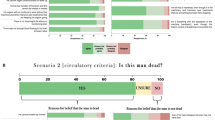Abstract
Family objections to evaluating a patient for death by neurologic criteria, or “brain death,” are challenging for the family and the medical team. In this article, we categorize brain death evaluation refusals into a taxonomy: informational objections, emotional objections, and principled objections. We offer suggested approaches for clinicians to respond to refusals on the basis of the category. The category of objection may also be important in considering when accommodation of refusals should be considered. The goal in all such situations is to promote compassionate, ethical, and equitable care for the patient and family.
Similar content being viewed by others
References
Russell JA, Epstein LG, Greer DM, et al. Brain death, the determination of brain death, and member guidance for brain death accommodation requests. Neurology. 2019;92:228–32.
Greer DM, Shemie SD, Lewis A, et al. Determination of brain death/death by neurologic criteria: the world brain death project. JAMA. 2020;324:1078–97.
Lewis A, Adams N, Chopra A, Kirschen MP. Organ support after death by neurologic criteria in pediatric patients. Crit Care Med. 2017;45:e916–24.
Lawson MM, Mooney CJ, Demme RA. Understanding of brain death among health-care professionals at a transplant center. Prog Transplant. 2019;29(3):254–60.
Fins JJ. Across the divide: religious objections to brain death. J Relig Health. 1995;34(1):33–9.
Flamm AL, Smith ML, Mayer PA. Family members request to extend physiologic support after declaration of brain death: a case series analysis and proposed guidelines for clinical management. J Clin Ethics. 2014;25:222–37.
Lewis A, Scheyer O. Legal objections to use of neurologic criteria to declare death in the United States: 1968 to 2017. Chest. 2019;155:1234–45.
Lewis A. Contentious ethical and legal aspects of determination of brain death. Semin Neurol. 2018;38:576–82.
Funding
Dr. Morrison’s time was supported by the Justin Michael Ingerman endowed chair in Palliative Care.
Author information
Authors and Affiliations
Contributions
Dr. Morrison conceived the topic and wrote the first draft of the article. Dr. Kirschen contributed to refining the framework and edited all drafts. Both authors approve of the final manuscript.
Corresponding author
Ethics declarations
Conflicts of interest
There are no conflicts of interest to disclose.
Ethical approval/informed consent
No institutional review board approval was needed.
Additional information
Publisher's Note
Springer Nature remains neutral with regard to jurisdictional claims in published maps and institutional affiliations.
Rights and permissions
Springer Nature or its licensor holds exclusive rights to this article under a publishing agreement with the author(s) or other rightsholder(s); author self-archiving of the accepted manuscript version of this article is solely governed by the terms of such publishing agreement and applicable law.
About this article
Cite this article
Morrison, W.E., Kirschen, M.P. A Taxonomy of Objections to Brain Death Determination. Neurocrit Care 37, 369–371 (2022). https://doi.org/10.1007/s12028-022-01580-6
Received:
Accepted:
Published:
Issue Date:
DOI: https://doi.org/10.1007/s12028-022-01580-6




